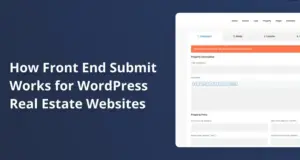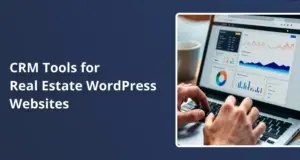Let’s face it! Most people don’t want to hear about the guy who cleaned your gutters over the weekend. You’d rather chat about the sweet listing in the heart of downtown or that charming little place by the beach.
As a real estate pro, you know that SEO isn’t merely a tool but a lifeline for your business. It drives potential clients to your listings, boosts your brand’s visibility, and keeps you ahead of the competition.
If you’re still wondering why you should care about real estate SEO, here are a few stats to consider. First, 93% of online experiences begin with a search engine; second, 43% of all homebuyers start their journey online.
Your website and listings must be at the top of search results where these homebuyers are looking.
Let’s break down real estate SEO step by step. You’ll learn how to handle industry challenges, work with Google’s algorithms, and use proven strategies to stand out online and get more leads. Let’s get started!
Understanding User Intent for Effective Real Estate SEO
First things first.
Let’s explore user intent. Knowing what your potential clients are looking for is essential to creating content that meets their needs and expectations.
In real estate world, this means anticipating the questions and concerns of buyers and sellers at every stage of their journey.
First-time homebuyers often begin with broad searches like “homes for sale” or “buying a house tips.” As they learn more, their queries become more focused, such as “how much can I afford?” or “best neighborhoods in [city].”
Your content strategy must be as dynamic as your clients’ needs to target these varied intents effectively. So, you should start by researching the types of queries your audience is making.
Keyword research tools like Ubersuggest and Semrush can provide insights into what people are searching for. Identify high-volume, relevant keywords, and map them to different stages of the buyer journey.
For example, early-stage buyers might search for educational content on market trends or neighborhood comparisons. In contrast, those closer to a decision might seek out property listings, virtual tours, or agent bios.
Aligning your content with user intent can help you create a content strategy that attracts traffic and nurtures leads. By answering your audience’s questions, you’ll be viewed as a helpful resource rather than just another agent trying to make a sale.
This approach fosters trust, a key ingredient in converting leads into clients. So, take the time to understand your audience’s journey and craft your content to guide them from inquiry to closing.
The result? A more engaged audience, higher conversion rates, and a reputation as the go-to expert in your market.
Find the Right Keywords
Keywords are the words people type into Google when looking for homes. Start by thinking about what your clients search for. They might use simple terms like “homes for sale” or longer phrases like “3-bedroom house in downtown Phoenix.”
Understanding search intent is crucial – some people are just browsing, while others are ready to buy or sell. Your keyword strategy should target both types of searches to capture leads at different stages of the buying process. The key is to think like your customers and use the exact words they would type into Google.
Focus on local keywords.
Those include your city or neighborhood names. These local terms help you connect with people who are looking in your area. For example:
- “Denver real estate agent”
- “Condos for sale in Miami Beach”
- “Best schools in Westfield”
- “Luxury homes in Scottsdale”
- “First-time home buyer program Austin”
Use Google’s search suggestions.
When you type “homes for sale” into Google, it shows related searches people use. Look at the “People also ask” section and the related searches at the bottom. These suggestions come from real user searches and are gold mines for keyword ideas.
Study your competition.
Look at what keywords other real estate agents in your area use on their websites. See what works and what gaps you can fill.
Visit your city’s top-ranking real estate sites and note what topics they cover. Please pay attention to their page titles, headings, and the words they use most often.
Focus on long-tail keywords.
These are longer, more specific phrases that may have less competition. While “homes for sale” is highly competitive, “3-bedroom homes under $400k in downtown Portland” might be easier to rank for.
These longer phrases often show stronger buying intent, too. People who search for specific details are usually closer to making a decision.
Use keyword research tools.
Google Keyword Planner, SEMrush, or Ahrefs can help you find search volumes and related terms. Look for keywords with decent search volume but not too much competition.
Free tools like Google Trends can show you which keywords are growing in popularity.
Think about voice search.
Many people now use voice assistants to search. They ask questions like “What’s my house worth?” or “How much are homes in Riverside?”.
Create content that answers these natural questions. Voice searches are usually longer and more conversational than typed searches.
Create Great Content for Each Page
Every page on your website should help visitors and naturally include your target keywords. Don’t just stuff keywords everywhere; Google notices this and may lower your rankings.
Content quality is more important than keyword density. You aim to create pages that genuinely help people while signaling to Google what your page is about. Good content keeps visitors on your site longer, which tells Google your page is valuable. The longer people stay on your pages, the better your rankings.
Make each property listing unique.
Instead of copying the basic MLS description, add details about the neighborhood, nearby schools, and special features. The extra data will help your listing stand out from others.
Write about the home’s history, recent updates, or what makes the location special. Describe the lifestyle someone could have in this home and neighborhood.
Write helpful blog posts.
Regular blog content keeps your site fresh and gives you more chances to rank for different keywords. Topics could include:
- “First-time home buying tips for [Your City]”
- “Best neighborhoods for families in [Your Area]”
- “What’s happening in the [Your City] housing market?”
- “How to stage your home for a quick sale”
- “School district guide for [Your County]”
- “Local market predictions for next year”
Create neighborhood guides.
Write detailed pages about each area you serve. Include information about average home prices, schools, shopping, restaurants, and local attractions.
These pages show Google you’re an expert in these areas and help buyers learn about neighborhoods. Update these pages regularly with new developments, businesses, or changes in the area.
Use proper headings and descriptions.
Your page titles should clearly state the page’s purpose and include your primary keyword. Write descriptions that make people want to click on your result.
Keep titles under 60 characters and descriptions under 160 characters. Your page title is like a headline – it should grab attention and include your most important keyword.
Add internal links.
Link between pages on your site to help visitors find related information. For example, if you mention a neighborhood in a blog post, provide a link to your dedicated neighborhood page.
Google will understand your site structure and keep visitors engaged longer if you use descriptive anchor text that tells people what they’ll find when they click the link.
Include photos and videos.
Real estate is visual, so use high-quality images and videos. Write descriptive captions and alt text for each image.
The descriptions help search engines understand what your images show and can help your photos rank in image search results. Professional photos can make the difference between someone clicking on your listing or scrolling past it.
Fix Technical Problems
Technical issues can hurt your rankings even if your content is great. Here are the most important fixes.
A technically sound website provides a better user experience and helps search engines crawl and index your pages more effectively. Even minor technical problems can prevent your best content from ranking well.
Google wants to show users websites that work perfectly, so fixing technical issues is essential for SEO success.
Make your site mobile-friendly.
More than half of property searches happen on phones. Your website must work well on small screens with fast loading times.
Test your site on different devices to ensure buttons are easy to tap and text is readable without zooming. Google uses mobile-first indexing, which means it looks at the mobile version of your site first when deciding how to rank you.
Speed up your site.
If your pages take over 3 seconds to load, over half of your visitors will leave. Compress your photos and remove unnecessary code to make pages load faster.
Use tools like Google PageSpeed Insights to identify specific speed problems. Site speed affects user experience and search rankings.
Optimize your images.
Real estate sites have many photos, which can slow down your site. Compress images without losing quality. Use modern formats like WebP when possible.
Give images descriptive file names like “kitchen-granite-countertops-seattle.jpg” instead of “IMG_1234.jpg.” Large, unoptimized photos are one of the biggest causes of slow real estate websites.
Fix broken links and errors.
Use tools like Google Search Console to find and fix broken pages or links that don’t work. Broken links frustrate visitors and hurt your search rankings. Check your site regularly for 404 errors and fix them quickly.
Organize your site.
Make it easy for visitors to find what they need. Use simple navigation menus and logical page structures. Create a sitemap that lists all your important pages. A well-organized site helps both users and search engines understand your content.
Use HTTPS security.
Make sure your website uses a secure connection (https://) instead of regular HTTP. Using HTTPS will protect user data and is a ranking factor for Google. Most web browsers now warn users when they visit non-secure sites.
Make your site accessible.
Ensure people with disabilities can use your site. Use clear heading structures, descriptive link text, and alt text for images.
It not only helps more people use your site but also helps with SEO. Many accessibility best practices also improve your search rankings.
Dominate Local Search
Real estate is all about location, so local SEO is crucial. When someone searches for “real estate agent near me,” you want to be the first result.
Local search is where real estate agents have the best opportunity to compete with larger companies. While you might not be able to outrank Zillow for “homes for sale,” you can outrank them for “real estate agent in [your city].”
Local SEO levels the playing field and helps small businesses compete with big companies. Most people prefer to work with local agents who know their area well, so local SEO plays to your strengths.
Claim your Google Business Profile.
This free listing helps you appear in local search results and Google Maps. Fill out every section completely:
- Business name, address, and phone number
- Business hours and services
- Photos of your team and office
- Regular updates about new listings
- Categories that describe your business
Keep your business information consistent.
Use the same business name, address, and phone number everywhere online – your website, Google, Facebook, Zillow, and other directories.
Even slight differences can confuse search engines. This consistency helps Google trust that all these listings refer to the same business.
Get customer reviews.
Encourage happy clients to leave Google reviews. Reviews help with local rankings and build trust with potential clients. Respond to all reviews, both positive and negative, professionally.
Ask satisfied clients to leave reviews on Google, and make it easy by sending them a direct link.
Create neighborhood pages.
Write detailed pages about each area you serve. Include information about homes for sale, schools, shopping, and local attractions.
This shows Google you’re an expert in these areas. Update these pages regularly with new information about developments, new businesses, or changes in the housing market.
Get listed in local directories.
Make sure your business appears on Zillow, Realtor.com, Yelp, and your local chamber of commerce website. These listings create citations that help with local SEO. Look for directories specific to your city or region.
Use local keywords throughout your site.
Include city and neighborhood names in your page titles, headings, and content. But do it naturally – don’t force keywords where they don’t belong. Write as if you’re talking to a local person who knows the area.
Add location pages for each area you serve.
If you work in multiple cities, create separate pages for each one. These pages will help you rank for searches in all your service areas. Each page should have unique content about that specific location.
Build Your Website’s Authority
Google sees links from other websites as votes of confidence. The more quality websites link to yours, the higher your rank.
Building authority takes time, but it’s one of the most important factors in SEO success. Think of backlinks as recommendations from other websites. The more reputable sites that recommend your website, the more Google trusts you.
Quality matters more than quantity – one link from a respected local newspaper is worth more than dozens of links from low-quality sites. Focus on building relationships in your community and industry to earn natural links over time.
Get listed in local directories.
Make sure your business appears on Zillow, Realtor.com, Yelp, and your local chamber of commerce website. These are trusted sites that can boost your authority. Look for directories specific to your region or real estate industry.
Write for local publications.
Offer to write articles about the housing market for local newspapers or blogs. They often include a link back to your website. Share your expertise about market trends or home buying tips. Position yourself as the local real estate expert.
Partner with local businesses.
Work with mortgage lenders, home inspectors, and moving companies. You can refer clients and link to each other’s websites. These partnerships benefit everyone involved and create natural link opportunities.
Create amazing content that others want to share.
Research reports, neighborhood guides, and helpful tools often get shared and linked to naturally. For example, create an annual market report for your city or a comprehensive first-time buyer guide. The better your content, the more likely others will link to it.
Get involved in your community.
Sponsor local events or join local organizations. Many will list sponsors on their websites with links. This will build your online presence and your local reputation. Look for opportunities to speak at local events or participate in community activities.
Guest post on real estate blogs.
Write articles for established real estate or home improvement blogs. This will get your name out there and usually include a link back to your site. Focus on providing value rather than promoting yourself.
Build relationships with local reporters.
When housing market news breaks, reporters often need expert quotes. Being a go-to source can lead to mentions and links in news articles. Develop relationships with journalists who cover real estate in your area.
Make Your Website User-Friendly
SEO isn’t just about getting visitors – it’s about keeping them on your site and turning them into clients. User experience and SEO work together.
People who have a good experience on your website stay longer and visit more pages. It tells Google your site is valuable and helpful. Good user experience also leads to more conversions, turning visitors into leads
and clients.
Everything you do to improve user experience will also help your SEO. Focus on making your website as helpful and easy to use as possible.
Make contact easy.
Put your phone number where people can see it. Use clickable phone numbers so mobile users can call you with one tap. Also, include your email address and office location.
Make it easy for people to reach you when they’re ready to buy or sell.
Add clear next steps.
Every page should tell visitors what to do next, whether to call you, fill out a form, or schedule a showing.
Use stand-out buttons and clear language, such as “Get Your Free Home Valuation.” Don’t make people guess what to do next.
Use high-quality photos.
Real estate is visual, so invest in professional photos. Make sure they load quickly and include descriptions for each image. Show homes at their best with good lighting and staging. Poor photos can hurt your credibility and turn away potential clients.
Show your expertise.
Include your certifications, awards, and client testimonials. It builds trust and shows you’re qualified to help. Add an “About” page that tells your story and experience. People want to work with agents they trust.
Make forms simple.
If you use contact forms, keep them short and ask for only the information you really need. Long forms can scare people away. The easier it is to contact you, the more leads you’ll get.
Add live chat if possible.
Some visitors prefer to ask questions through chat rather than calling. If you can respond quickly, this can help capture more leads. Many people are more comfortable starting with chat than making a phone call.
Include helpful tools.
Mortgage calculators, home value estimators, and neighborhood comparison tools can keep visitors on your site longer and provide value. These tools can also capture leads when people use them.
Use clear navigation.
Make it easy for visitors to find what they’re looking for. Use descriptive menu labels and include a search function for your listings. Your navigation should be intuitive and work well on both desktop and mobile.
Track Your Results
SEO takes time to work, but you need to monitor your progress. Use Google Analytics to see how many visitors come from search engines and what they do on your site. Tracking your results helps you understand what’s working and what needs improvement.
Without measurement, you won’t know if your SEO efforts are paying off. Set up tracking from the beginning to see your progress over time. Regular monitoring also helps you catch problems early before they hurt your rankings. Make data-driven decisions about where to focus your SEO efforts.
Watch your rankings.
If you’re not showing up for “real estate agent [your city],” you must keep improving. Check your rankings monthly and track progress over time. Focus on keywords that are most likely to bring you clients.
Monitor your Google Business Profile.
Respond to reviews and keep your information updated. Check how many people view your profile and how many call or visit your website. Your Google Business Profile is often the first thing people see when they search for you.
Check your website traffic.
Use Google Analytics to see which pages get the most visitors and where they come from. Look for patterns in what content performs best. This information helps you create more of the content that works.
Track your leads.
Set up goal tracking to see how many visitors become leads. This will help you understand what SEO efforts are bringing to your business. Focus on metrics that matter to your bottom line.
Test different approaches.
Try different headlines, photos, or calls-to-action to see what works best for getting leads. Small changes can sometimes make a big difference. Test one thing at a time so you know what caused any changes.
Use Google Search Console.
This free tool shows which keywords bring people to your site and how often your pages appear in search results. It also alerts you to any technical problems. Check it regularly for insights about your search performance.
Monitor your competition.
Keep an eye on what other agents in your area are doing. If they start ranking higher, see what they’re doing differently. Learn from their successes and avoid their mistakes.
Stay Consistent
SEO success doesn’t happen overnight. It usually takes 6-12 months to improve your rankings significantly. But once you start ranking well, you’ll get a steady stream of free, high-quality leads.
Consistency is the key to SEO success. Google rewards websites that regularly publish fresh, helpful content. Don’t expect quick results, but don’t give up if you don’t see immediate changes.
SEO is a long-term investment that pays off over time. The agents who stick with SEO consistently dominate local search results. Think of SEO as building a foundation for your business that will pay dividends for years.
Keep adding fresh content.
Update your blog regularly with local market news and helpful tips for buyers and sellers. Fresh content shows Google your site is active and current. Aim to publish new content at least once a week, even if it’s just a short market update.
Update your existing pages.
Go back to old blog posts and pages to add or improve new information. This can help boost their rankings. Google likes to see that you’re keeping your content current and accurate.
Monitor your competition.
See what successful agents in your area are doing and learn from their strategies. But don’t copy them exactly – find ways to do it better. Look for gaps in their content that you can fill.
Stay up-to-date with SEO best practices.
Google updates its algorithm regularly, so what works today might need adjustment tomorrow. Follow reputable SEO blogs and Google’s updates. The fundamentals don’t change much, but tactics evolve.
Be patient but persistent.
SEO is a long-term strategy, not a quick fix. Keep working at it consistently, and you’ll see results over time. Don’t get discouraged if you don’t see immediate changes.
Focus on quality over quantity.
It’s better to have a few really good pages than many poor ones. Take time to create valuable content that genuinely helps your audience. Quality content lasts longer and performs better over time.
Advanced SEO Strategies
Once you’ve mastered the basics, you can try more advanced techniques. These strategies can help you get better results and stay ahead of your competition.
Advanced SEO takes more time and effort, but can give you a significant advantage in competitive markets. Don’t try these until you’ve got the basics working well. Build your foundation first, then add these advanced techniques to dominate your local market.
Create pillar pages and topic clusters.
Build comprehensive pages about major topics (like “Buying a Home in [Your City]”) and link them to related blog posts. This shows Google you’re an authority on these topics. Group related content together to create a clear structure.
Use schema markup.
This special code helps search engines understand your content better. You can mark up property details, reviews, and business information for real estate. Schema can help you get rich snippets in search results.
Optimize for featured snippets.
These are the boxes that appear at the top of some search results. Answer common questions clearly and concisely to increase your chances of being featured. Format your content to match how featured snippets appear.
Build local citations.
Get your business listed in as many relevant local directories as possible. Consistency is key – make sure your information is the same everywhere. Focus on quality directories that are relevant to real estate.
Create video content.
Property tours, market updates, and educational videos can help with SEO and engage your audience. Upload videos to YouTube and embed them on your website. Video content often ranks well in search results.
Common SEO Mistakes to Avoid
Learn from these common mistakes that can hurt your rankings. Many real estate agents make these errors without realizing they hurt their SEO. Avoiding these mistakes is just as important as doing the right things.
Some of these mistakes can even cause Google to penalize your website, meaning you’ll disappear from search results entirely. It’s better to do SEO slowly and correctly than to try shortcuts that backfire.
Focus on building a solid, sustainable SEO strategy that will work for years.
Don’t copy content from other sites.
Google penalizes duplicate content. Always write original descriptions and blog posts. Even copying MLS descriptions word-for-word can hurt your rankings.
Don’t ignore local SEO.
Many real estate agents focus only on general SEO and miss out on local opportunities. Local SEO is where you have the best chance to compete and win.
Don’t neglect mobile users. You’ll lose visitors and rankings if your site doesn’t work well on phones. Most of your potential clients are searching on mobile devices.
Don’t buy fake reviews or links.
These tactics can get you penalized by Google and hurt your reputation. Focus on earning genuine reviews and links through good service and valuable content.
Don’t ignore page speed. Slow sites frustrate users and rank lower in search results. Real estate sites with many photos must be especially careful about loading speed.
Don’t forget to track results.
Without monitoring, you won’t know what’s working and what isn’t. Set up analytics from the beginning and check them regularly.
Frequently Asked Questions
How long does it take to see results from SEO?
Ah, the million-dollar question! Typically, you’ll start seeing some results within three to six months. However, this timeline can vary depending on several factors, such as the competitiveness of your keywords, the age of your website, and the quality of your content.
Do I need to learn coding to do SEO?
Not at all! While some technical knowledge can be helpful, you don’t need to be a coding whiz to succeed in SEO. Most technical stuff can be handled with plugins (see Yoast) or by hiring freelancers for specific tasks.
Are there any SEO mistakes I should avoid?
Plenty! Keyword stuffing, not using mobile-friendly design, neglecting local SEO, ignoring online reviews, and failing to monitor your performance are just a few rookie errors that can set you back. Always stay updated with SEO best practices and guidelines.
Top 20 SEO Tools: Features & Pricing Overview
Below is a curated selection of the most recommended SEO tools for 2025, including a brief description of what each tool excels at and typical pricing.
Google Search Console
Ideal for monitoring site performance, indexing status, and technical SEO issues.
Pricing: Free
Ahrefs
Known for industry-leading backlink analysis, keyword research, and competitor tracking. Best suited for SEO professionals and agencies.
Pricing: Starts at $99/month
Semrush
A comprehensive, all-in-one SEO platform offering keyword research, content optimization, site audits, and rank tracking.
Pricing: $119–$140/month
Morningscore
An all-in-one SEO tool with a gamified workflow and built-in AI features, designed to make optimization more intuitive and engaging.
Pricing: From $49/month
Surfer SEO
Excellent for content optimization with data-backed SERP analysis and actionable on-page suggestions.
Pricing: $59–$99/month
Moz Pro
A robust tool for keyword tracking, site audits, and link analysis. Great for consultants and small teams.
Pricing: Starts at $99/month
AnswerThePublic
Best for discovering long-tail keyword opportunities and trending questions.
Pricing: Free plan available; paid plans start around $9/month
Google Keyword Planner
Provides accurate search volume and CPC data for keyword planning. Especially useful for PPC and SEO campaign alignment.
Pricing: Free
SE Ranking
Offers keyword tracking, site audits, backlink monitoring, and integrated AI modules in a user-friendly platform.
Pricing: $39–$65/month
Screaming Frog
The go-to tool for technical SEO audits and comprehensive site crawling.
Pricing: Free for small sites; $259/year for full features
Ubersuggest
A beginner-friendly tool offering keyword suggestions, backlink data, and SEO audits.
Pricing: Starts at $12/month
Yoast SEO (WordPress)
A leading WordPress plugin for managing on-page SEO, meta tags, and readability.
Pricing: Free version available; Premium at $99/year
Rank Math (WordPress)
An advanced SEO plugin for WordPress users featuring schema integration, keyword optimization, and rich snippet support.
Pricing: Free version available; Pro starts at $5/month
Mangools
A budget-friendly SEO suite with tools for keyword research, SERP analysis, and backlink tracking.
Pricing: Starts at $29/month
SEObility
Performs detailed site audits and tracks keyword rankings with an emphasis on technical performance.
Pricing: Free plan available; Premium starts at $50/month
Rich Results Test
A tool for testing schema markup and ensuring structured data is properly implemented.
Pricing: Free
ShortPixel
Specializes in image compression to improve page speed and overall site performance.
Pricing: From $4.99/month
KeywordTool.io
Generates keyword suggestions using Google Autocomplete and other search engines.
Pricing: Free version available; Pro starts at $89/month
PageSpeed Insights
Analyzes site performance and provides actionable recommendations for improving load speed and Core Web Vitals.
Pricing: Free









